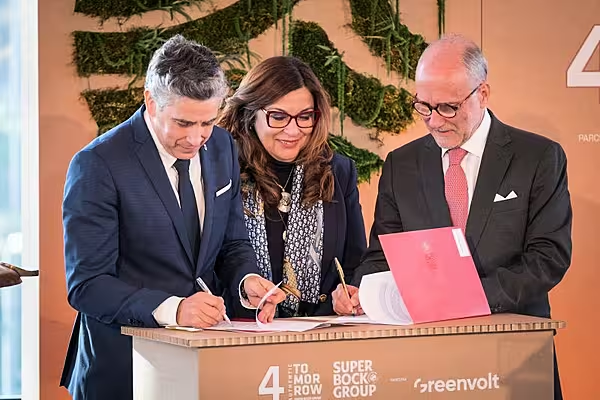As Trevor Lewis fills a second shopping cart full of wine in a supermarket in Calais, France, he reckons his biannual buying spree will cost 100 pounds ($148) less this time around because of the beneficial exchange rate.
His wife, Vivien, isn’t so sure as he simply piles more crates into his cart. Whoever’s right, the couple from Potters Bar near London are among a growing number of Brits taking advantage of sterling’s surge to a seven-year high versus the euro to stock up on luxuries by taking a ferry across the English Channel.
“We usually spend 500 pounds but it’s a bit different now because of the euro,” Lewis said during their March 26 visit to the Citi Europe shopping center, a five-minute drive from the ferry terminal. “Buying here is just much, much cheaper for us.”
“We’re not wine connoisseurs,” his wife added. “I just go by the label and the dimple in the bottom!”
The exchange rate contributed to a 12.4 per cent increase in passengers traveling through the Port of Dover on England’s south eastern tip in the first quarter compared with a year earlier, according to figures published this week by Europe’s busiest ferry port.
A bottle of the Lewis’s favourite French red costs 13 per cent less than a year ago due to the euro’s plunge against the pound, the result of the European Central Bank’s unprecedented stimulus measures.
Speaking English
A jump in tourist numbers to euro-zone countries is exactly the sort of economic benefit the ECB hoped would result from its 1.1 trillion-euro ($1.2 trillion) quantitative-easing program, which has debased the region’s currency by expanding the money supply.
Such cross-border bargain hunting is widely known as a booze cruise because shoppers often travel by ferry, though they can also take the Eurostar Group Ltd. train beneath the Channel.
The bargains are only likely to get better if strategists are right about the future advance of the pound. Analysts surveyed by Bloomberg see 1 euro costing 70 pence by year-end, compared with 71.94 pence as of 5:14 p.m. London time on Thursday and as little as 70.14 pence last month.
Pound Signs
On a damp Thursday afternoon in the French superstore, the booze cruise certainly lived up to its name, with most of the travellers buying cheap wine and spirits. Sales assistants offered wine samples and advice in fluent English, under promotion signs emblazoned with the Union Flag and listing prices in sterling.
“We’re getting a lot more for our euro,” said Joan Deal, a retiree from Dover who used a promotion clipped from The Sun tabloid newspaper to cross to France for just 17 pounds. “We know we’re getting a good deal.”
While sterling has slipped almost 3 per cent from its March 11 peak versus the euro on concern that Britain’s general election next month won’t produce a clear winner, it’s still about 13 per cent stronger than its average over the past five years.
The pound has benefited from investor speculation that the U.K. economy is improving enough for the Bank of England to consider raising interest rates. The currency has outperformed more than half of its Group of 10 peers even as it’s fallen versus the dollar.
Lower Taxes
Booze cruises have been popular for decades as Britons took advantage of the lower taxes on the continent. On wine, the levy is about 100 times cheaper than in the U.K.
The practice declined in the last decade as the euro surged toward parity with sterling in the run-up to the global financial crisis. British retailers Tesco Plc and J. Sainsbury Plc reacted by closing their Calais wine stores in 2010.
Now, a litre of Smirnoff vodka at the Calais mall’s Carrefour SA store retails at 17.56 euros, a third less than at Tesco in the U.K., where it costs 19 pounds. A bottle of Moet & Chandon champagne sells for 30 percent less.
Iris Crespo runs high-end grocer Maison Du Fromage et Des Vins in the Calais town centre. She says most U.K. shoppers stick to the superstores near the ferry and rail terminals, but even she’s seen a pick-up in business since the pound surged.
“We are seeing an English customer every day again,” she said from behind a counter stocked with cheeses from across Europe. “Suddenly, two weeks ago, it went poof! Like a souffle!”
News by Bloomberg, edited by ESM














